#John scalzi’s the big idea column
Explore tagged Tumblr posts
Text

It’s so good

#the cloud roads#Martha wells#John scalzi’s the big idea column#vintage 2011#the books of the Raksura
3 notes
·
View notes
Text
8 years of All Things Linguistic
It’s my eight year blogiversary! Wow! Let’s celebrate by looking back at some of my favourite posts from the past year:
Because Internet
My book about internet language came out in July 2019. Here are a few of my favourite blog posts about it:
Because Internet hit the New York Times bestseller list its first week out
that classic tumblr flowing jungle river post is now cited in a real book, like an actual paper book
Linguistics jobs: interview with an internet linguist
A very special leather-bound edition of Because Internet that my publisher had made just for me, in celebration of my book becoming a bestseller!
A sample of me reading the Because Internet audiobook (previous thread about recording it)
I now have a speaking reel, if you're wondering what it's like when I'm giving a talk about internet linguistics
Someone dressed up as my book for Halloween!
I also did over 200 media interviews for the book, but I've already summarized those on my 2019 year in review post.
Wired Resident Linguist column
I kept writing my Ideas column for Wired, which included these articles:
Fans are better than tech at organizing information online (about the Archive of Our Own)
The meaning of all caps -- in texting and in life (excerpt from Because Internet)
New emoji are so boring -- but they don't have to be
Boomerspeak is now available for your parodying pleasure
Other writing
We Learned to Write the Way We Talk (New York Times Op Ed)
How Can You Appreciate 23rd-Century English? Look Back 200 Years (New York Times Op-Eds From the Future - I was very proud that this op-ed got me no fewer than five (5!) entries in New New York Times, a twitter account that tracks words that appear in the New York Times for the first time.)
We Will Have Meme Folklorists (New York Magazine)
How to use irony on the internet (Wall Street Journal)
The Big Idea: Writing towards the future (John Scalzi’s Whatever)
I also co-wrote an academic article with Lauren Gawne, Emoji as Digital Gestures in the journal Language@Internet [Open Access], for which Lauren wrote an accessible summary version for The Conversation.
Surprising internet crossovers
After 7 years of blogging, I thought I had pretty much figured out which sections go in this yearly summary post. But for year 8, I've found myself needing to add a delightful new one.
I’m in an xkcd hovertext (about ok vs okay)
Lingthusiasm's tote bags are in an SMBC comic
Because Internet is on the official tumblr books blog and tumblr's twitter account
A Because Internet cameo on the official Steak Umm brand account
A Because Internet fact featured in the QI twitter account
Lingthusiasm
We celebrated our third year of making Lingthusiasm, a podcast that's enthusiastic about linguistics! This year we were recommended by Buzzfeed (!!), which called Lingthusiasm “joyously nerdy”.
The most exciting Lingthusiasm episodes this year were the ones where our guests helped me and Lauren Gawne push the boundaries of what a podcast typically is: this video episode in ASL and English interviewing Lynn Hou about her research on signed languages in real-world contexts and the one where Janelle Shane used a neural net to generate fake Lingthusiasm quotes based on our existing transcripts, and then we performed the best ones out loud (see also Janelle's blog post about making this).
Here's all twelve regular monthly Lingthusiasm episodes:
Why spelling is hard - but also hard to change
Emoji are Gesture Because Internet
Putting sounds into syllables is like putting toppings on a burger
Villages, gifs, and children - Interview with Lynn Hou on signed languages in real-world contexts (also a video episode!)
Smell words, both real and invented
Many ways to talk about many things - Plurals, duals, and more
How to rebalance a lopsided conversation
Making machines learn language - Interview with Janelle Shane
This time it gets tense - the grammar of time
What makes a language easy? It's a hard question
The grammar of singular they - Interview with Kirby Conrod
Schwa, the most versatile English vowel
And the twelve monthly bonus episodes:
North, left, or towards the sea? With guest Alice Gaby
Words from your family - Familects!
Welcome aboard the metaphor train!
Behind the scenes on Because Internet (Q&A)
Jobs, locations, family, and invention - Surnames
Reading fiction like a linguist
The sounds of sheep, earthquakes, and ice cream - Onomatopoeia
What might English be like in a couple hundred years?
Generating a Lingthusiasm episode using a neural net
Teaching linguistics to yourself and other people
When letters have colours and time is a braid - The linguistics of synesthesia
A myriad of numbers - Counting systems across languages
We also started a Discord community that's enthusiastic about linguistics, to solve the problem of “Your podcast got me (back) into linguistics, but now I don’t have people to fan out about language with! Where do I make lingthusiastic friends?”
Finally, we released more Lingthusiasm merch: schwa pins and more that say Never Stressed, greeting cards that say “thanks” or “congrats” on them in IPA; the pun-tastic “glottal bottle” and liquids for your liquids bottle/mug; and shirts/mugs/bags that say Linguistic “Correctness” is just a lie from Big Grammar to Sell More Grammars. (See photos of all the Lingthusiasm merch here.)
Other projects
Lauren Gawne and I also started working on several other projects in the pop linguistics ecosystem online:
LingComm Grants - grants to help the next generation of linguistics communication projects get started, which we were able to expand from one grant to four thanks to the support of our patrons. Grantees to be announced in upcoming months!
Mutual Intelligibility - a newsletter summarizing existing linguistics resources on specific topics to help instructors moving their courses online, including shorter 3 Links posts and longer Resource Guides
Linguistics Crash Course - a series of intro linguistics videos in collaboration with the educational youtube channel Crash Course and linguist Jessi Grieser, to appear later in 2020
Blog posts, generally
Internet linguistics
An analysis of the meaning behind different kinds of screenshots
Bridging the internet’s digital language divide
Scots language on twitter and How Twitter is helping the Scots language thrive in the 21st century
Wikipedia is helping keep Welsh alive online
Voicemail and voice chat
How grammatical systems cause machine translation mismatches
The complicated decisions that come with digitizing indigenous languages
The Bender Rule: why it matters to name the language(s) we study, even when it’s English
Duolingo and smaller languages: useful, but also complicated
Smartphone keyboard support for under-represented languages
An article about efforts to translate internet resources into Kaqchikel and other indigenous languages
Linguistics memes and humour
Are your teens secretly texting about languages using ISO-639-3 codes?
“linguist with questions” as the goose in Untitled Goose Game
Linguistics takes on the Roses are red meme
académie française: you can’t just make up new words willy-nilly like that!!! linguists: haha language machine go brrrr
Bohemian Rhapsody but linguistics
Falkland Islands – new favourite example of pronunciation ambiguity from TikTok
Last Christmas / I gave you a chart
Good King Wenceslo / Good King Wenceslas
xkcd: vowel alignment chart
two wugs social distancing
Gricean Humour: how did you find your meal?
Which Indo-European Subfamily are you? (the Buzzfeed quiz we didn't know we needed)
General linguistics
Guides for teaching or self-teaching the International Phonetic Alphabet
Lox: the English word that hasn’t changed in sound or meaning in 8000 years
Why parrots can talk like humans
To B or not to B – Sir Patrick Stewart on Sesame Street
The chicken/poultry cow/beef animal/food loanword phenomenon also exists in isiXhosa
No, that dog on instagram can’t really talk
Watching a “language” develop when kids can’t speak to each other
These students speak perfect Spanglish — and now they’re learning to own it
Interpretation/translation, subtitles, and a speech by Korean director Bong Joon-ho
Comparative evolution of Cuneiform, Egyptian, and Chinese characters
Grammatical gender in Greek and Latin is more complex than most people think
Indigenous languages of Taiwan are regaining prominence
This is not a joke: a baby was named Diot Coke in 1379
Things that should happen in a sci fi story with a universal translator
A linguist on what Baby Yoda’s first words might be
When people move their hands and arms while using their voices, listeners are able to hear it
Linguistics jobs (mostly by Lauren Gawne)
learning scientist at Duolingo
communications specialist
product manager
software engineer
marketing content specialist
community radio outreach coordinator
exhibition content manager at Planet Word, an upcoming language museum
transcriptionist (for Lingthusiasm and other linguistics podcasts)
A parody post about linguistics jobs: wug farmer
New grad school advice post: do I need to have done a linguistics major to apply for linguistics grad school?
Creative linguistics creations
A very linguistic wedding cake
Cookies decorated with IPA symbols
Linguistics Halloween costumes/pumpkins
Wug fingernail art
Happy Purim from two wugs!
Language Files videos
I collaborated with Tom Scott and Molly Ruhl on a series of short youtube videos about linguistics.
why typing like this is sometimes okay.
Why “No Problem” can seem rude: Phatic expressions
The language sounds that could exist, but don't
Can the words you read change your behaviour?
Why do we move our hands when we talk?
The sentences computers can't understand, but humans can
The hidden rules of conversation (Gricean maxims)
Abso-b████y-lutely: Expletive Infixation
A series on Weird Internet Careers
A reflection on how starting All Things Linguistic back in 2012 was the seed that led to all of the interesting and exciting things I'm doing now, including writing articles, writing a book, and doing the podcast -- and how to approach trying to do something similar.
Part I – What is a Weird Internet Career?
Part II – How I Built a Weird Internet Career as an Internet Linguist
Part III – How to start a Weird Internet Career
Part IV – How to make money doing a Weird Internet Career
Part V - What can a Weird Internet Career look like?
Part VI - Is it too late for me to start my Weird Internet Career?
Part VII - How to level up your Weird Internet Career
Haven’t been with me this whole time? You can see my favourite posts of year one, year two, year three, year four, year five, year six and year seven.
For shorter updates, follow me on twitter as a person, as my blog, or as the podcast, or for a monthly newsletter with highlights, subscribe on substack.
#linguistics#lingblr#langblr#roundup#blogiversary#because internet#lingthusiasm#link roundup#linkpost#top posts#book#podcast#anniversary#anniversary post
210 notes
·
View notes
Text
“In My End is My Beginning”: the Post-Camp Novel Effort

Now that the frenzy of Camp NaNoWriMo has passed, it’s time to figure out what’s next! That could be anything from taking a break from your manuscript to diving right into edits or revisions. Today, participant Susan Tait shares her plan for post-Camp noveling:
I feel stunned. In the afterglow of “I really did write 52,000 words in a month!” the post-Camp effort of organizing my writing feels like trying to unload hastily-packed boxes after moving to a new house. There’s all this stuff that got crammed in during the fury to finish.
Advice was never-ending and contradictory, so I stopped reading it. It mostly amounted to this:
“Don’t edit while you write! Just get it out!”
“Edit while you write, or you’ll just have a big mess at the end.”
I think they’re both right. The novel’s gotten “out,” but what’s gotten out has more obvious problems than strengths: outline fragments, broken dialogue, zeroes filled in for o’s the week I switched keyboards (how did I forget to review my spelling and grammar more often?), a fantastic idea I remember having but can’t find, paragraphs that “seemed like a good idea at the time.” Acknowledgement for source quotes and research notes is so far behind that it feels like another book. Plus the dawning realization that some of my cardboard characters spitefully defied their assigned roles and did what they wanted to.
Now, in the aftermath, I could:
Put the whole binder in the drawer as evidence of effort, and write a short story that I resist titling, “And Now For Something Completely Different.”
Wax philosophical about what I learned, writing a personal development essay that will make it clear to me what I know now that I didn’t then.
Rewrite, revise, review. I can do the other two things any time. Perhaps a character with the worst character arc needs a short story to clear things up. Maybe a decision diagram on tracing paper superimposed on a generously sized timeline would show me where things went wrong—or if I’ve actually written some alternative history.
To my surprise, I like what I have enough to pursue polishing the messy draft that I started last month. To pick the advice that’s going to work for me, I need only remember one thing:
Maintain my engagement with my characters while re-engaging with my readers.
Some of my characters are based on real people, others completely invented. They all have a real relationship with me, something like the relationship of befriending people online that you never meet in real life. My characters make me look at how I engage with people and what I project onto them.
It doesn’t matter in what order I fix all the problems with my draft. What matters is that I start a process that will create a community larger than the sum of my novel’s parts: that place where characters and readers meet. The only way to build that is to start where I am, regarding my dirty draft as clean compost.
I adopted my writing motto (and the title of this post) from Mary, Queen of Scots: the end of the dirty draft is the beginning of a new chapter.
Recommended Links:
Looking at a fresh start for content that will integrate easily? Try L.E. DeLano’s suggestion in her recent Swoon post on why you should know what changed for you and your character last month.
I don’t write what I know; I write to find out what I don’t. Sounds like you? This Atlantic column on the value of fiction shores up exploratory writers.
This FAQ with award-winning novelist John Scalzi goes much wider than science fiction—terse, kind, and some of the comments are also pretty funny and helpful.

Susan’s first novel collapsed into a short story that she round-filed. It taught her enough to succeed at her second novel, which she wrote during NaNoWriMo 2017, and finished during the Now What? Months in February 2018. Fountain pen fiend, amateur painter, past winner of two Writer’s Digest competitions, and a certified scrum master, she lives in Oregon with her husband, son, and three cats. See more about her on LinkedIn.
Top image licensed under Creative Commons from Sandy/Chuck Harris on Flickr.
80 notes
·
View notes
Text
SF & FANTASY WEEK - Continuum Trilogy
Welcome to
THE PULP AND MYSTERY SHELF SF and Fantasy Week!
DISCLAIMER: This content has been provided to THE PULP AND MYSTERY SHELF by the author. No compensation was received. This information required by the Federal Trade Commission.
About the Books
THE 13TH CONTINUUM
One thousand years after a cataclysmic event leaves humanity on the brink of extinction, the survivors take refuge in continuums designed to sustain the human race until repopulation of Earth becomes possible. Against this backdrop, a group of young friends in the underwater Thirteenth Continuum dream about life outside their totalitarian existence, an idea that has been outlawed for centuries. When a shocking discovery turns the dream into a reality, they must decide if they will risk their own extinction to experience something no one has for generations—the Surface.
RETURN OF THE CONTINUUMS
As Myra and her friends set out to find the First Continuum, they must navigate a hostile landscape and even more hostile inhabitants of other continuums with their own ideas about the future of the human race. In the pulse-quickening sequel to The 13th Continuum, the young heroes must make an unlikely ally if they are to survive long enough to reach their destination and learn the secret behind humanity’s destruction and the hope for its survival.
THE UNITED CONTINUUMS
In the epic conclusion to the award-winning Continuum Trilogy, Aero leads a group insurgents from the Second Continuum to overthrow his rival Supreme General Vinick and unite his space colony’s military forces, while Seeker takes on a secret mission back to her home colony to reinforce Earth’s defenses and defend the First Continuum against an even greater threat. Myra’s nightmares have become a reality as the Dark Thing hurtles toward Earth with designs on eradicating the planet’s fledgling populace. The only thing standing in the way are the three Carriers and those who would join them to fight against a second coming of the Doom.
Purchase at Amazon
Also Available
Includes short story by Jennifer Brody entitled “Let Me In”
Pre-order at Amazon
Interview with the Author
What initially got you interested in writing?
I’m a voracious reader and love getting lost in books. Nothing is better than reading a great book that you can’t put down. I started out my career working in Hollywood on many book adaptations, like The Lord of the Rings films. Eventually, I realized that instead of working on other people’s stories, I wanted to write my own. That sent me on my journey to writing The 13th Continuum and becoming a published author.
What genres do you write in?
I write big worldbuilding science fiction—and it’s my main passion. That said, I love stories of all kinds. My next book will be a YA Romance Space Opera (so fun!). But I’m kicking around an idea for a thriller and a fantasy book after that. I’ll see where my ideas take me.
What drew you to writing these specific genres?
Let’s see … basically I’m a giant nerd. I love Star Wars, Edgar Rice Burroughs’ Mars books, Kurt Vonnegut, Asimov, Tolkien, A Wrinkle in Time, Tamora Pierce, Anne McCaffrey and more! I love getting lost in big worlds—and creating them is even more fun. I also love asking what if questions and imagining where our current path could take us in the future.
How did you break into the field?
The usual way—writing a manuscript, querying agents, getting signed, then my agent submitting to publishers. Actually, some film producers slipped my unpublished manuscript for The 13th Continuum to Turner Publishing, who fell in love and bought my trilogy.
What do you want readers to take away from reading your works?
I want them to fall in love with my characters and get lost in alternate realities. I’d also love them take away the warnings present in the Continuum Trilogy (don’t want to spoil it).
What do you find most rewarding about writing?
I love getting lost in the writing process and creating new worlds. It’s kind of like choose your own adventure, except I’m the author. I also especially love my younger readers. They’re so passionate about the books they love. Getting kids excited to read is a dream come true.
What do you find most challenging about writing?
The rejection. Sometimes, it can feel endless. My first manuscript didn’t sell—it’s my drawer novel. But I learned a ton writing it, and it landed me a great book agent. Also, the uncertainty in the market causes some stress. I do best when I just focus on a story I love and that I feel compelled to tell. I love the hard work and craft of a writing a novel.
What advice would you give to people wanting to enter the field?
Take classes, like the ones I teach for the Writing Pad in LA. Seek out communities and other writers in your area. Read, read, read, read. Write what you LOVE the most.
What type of books do you enjoy reading?
Everything and anything in between! As long as it’s good writing and a compelling story. Recent-ish favorite authors:
Adult folks: Victor LaValle, Victoria Schwab (she also writes YA), N.K. Jemisen, Marlon James, Anthony Doerr, Neil Gaiman, Joe Hill, Meg Wolitzer, Andy Weir, John Scalzi, Marko Kloos
YA folks: Leigh Bardugo, Amy Spalding, Robin Talley, Angie Thomas, Kelly Link, Livia Blackburne, Marie Lu, Stephanie Garber
Is there anything else besides writing you think people would find interesting about you?
I was born in St. Croix in the USVI, grew up in Appalachia, and graduated from Harvard with a degree in film. I began my career in Hollywood, working on the remake of The Texas Chainsaw Massacre. I went on to work at New Line on films, including The Lord of the Rings films, The Golden Compass, Birth, etc. I produced a teen dance film called Make It Happen, starring Mary Elizabeth Winstead and Tessa Thompson. It was the first film to feature a Lady Gaga song.
What are the best ways to connect with you, or find out more about your work?
I’m super reachable and love hearing from readers!
Jennifer Brody
Award-Winning Author of The Continuum Trilogy
Website: jenniferbrody.com
Twitter: @jenniferbrody
Instagram: @jenniferbrodywriter
Snapchat: @jendawnbrody
Facebook: www.facebook.com/jenniferbrodywriter
Mailing List Signup: http://eepurl.com/ciNpvH
About the Author
Jennifer Brody’s award-winning novel The 13th Continuum sold in a 3-book deal and is being packaged into a feature film. The book is a Gold Medal Winner (Young Adult – Sci-Fi/Fantasy) from the Independent Publisher‘s Moonbeam Children’s Book Awards. Return of the Continuums and The United Continuums complete this epic trilogy. Her short fiction appears in the upcoming From the Stars anthology and Common Deer Press’ Short Tails. She is a graduate of Harvard University, a creative writing instructor at the Writing Pad, and a volunteer mentor for the Young Storytellers Foundation. She’s also a board member for the non-profit science fiction writing competitions the Roswell Award and the Tomorrow Prize. She also founded and runs BookPod, a social media group for authors.
After studying film at Harvard University, Jennifer began her career in Hollywood. Highlights include working for New Line Cinema, most notably on The Lord of the Rings films, The Golden Compass, and The Texas Chainsaw Massacre. In 2008, she produced the feature film Make It Happen starring Mary Elizabeth Winstead and Tessa Thompson. She lives and writes in LA with her husband and one-eyed miniature Goldendoodle named Commander Ryker.
Related Post
SHANNON MUIR’S THURSDAY THOUGHTS – Mor...
BLOG TOUR – Highland Peril
BLOG TOUR – Five-Six, Deadly Mix
BLOG TOUR – A Perfect Manhattan Murder
.yuzo_related_post img{width:120px !important; height:110px !important;} .yuzo_related_post .relatedthumb{line-height:15px;background: !important;color:!important;} .yuzo_related_post .relatedthumb:hover{background:#fcfcf4 !important; -webkit-transition: background 0.2s linear; -moz-transition: background 0.2s linear; -o-transition: background 0.2s linear; transition: background 0.2s linear;;color:!important;} .yuzo_related_post .relatedthumb a{color:!important;} .yuzo_related_post .relatedthumb a:hover{ color:}!important;} .yuzo_related_post .relatedthumb:hover a{ color:!important;} .yuzo_related_post .yuzo_text {color:!important;} .yuzo_related_post .relatedthumb:hover .yuzo_text {color:!important;} .yuzo_related_post .relatedthumb{ margin: 0px 0px 0px 0px; padding: 5px 5px 5px 5px; } jQuery(document).ready(function( $ ){ //jQuery('.yuzo_related_post').equalizer({ overflow : 'relatedthumb' }); jQuery('.yuzo_related_post .yuzo_wraps').equalizer({ columns : '> div' }); })
Tweet
SF & FANTASY WEEK – Continuum Trilogy was originally published on the Wordpress version of The Pulp and Mystery Shelf with Shannon Muir
0 notes
Text
All Things Linguistic - 2019 Highlights
2019 was a very big year for me.
My book about internet language, which I'd been working on since 2014, finally came out into the world! Because Internet hit the New York Times bestseller list and was one of TIME's 100 books of 2019, plus tons of other media.
I wrote two op-eds for the New York Times and continued writing my Resident Linguist column at Wired, and we made two special video episodes of my podcast, Lingthusiasm.
Book: Because Internet
There were around 200 media hits for Because Internet (I'm sure I'm missing a few). Here are a few highlights:
Two (!!) reviews in the New York Times, by Jennifer Szalai (NYT Daily) and Clay Shirky (NYT Book Review)
Two reviews in the New Yorker, by Katy Waldman and Mary Norris
Reviews in: The Economist, Time Magazine, Wall Street Journal, The Atlantic, Science Magazine, The Times (of London), the Observer/Guardian, BBC Science Focus.
NPR: All Things Considered and Science Friday
BBC World News
Trade reviews: Kirkus, Publisher’s Weekly (starred), Booklist, and Library Journal
Podcasts: The Cracked Podcast, The Allusionist, Grammar Girl, Slate’s “Lexicon Valley”, New York Times Book Review podcast, The Ezra Klein Show
Lists: TIME’s 100 Must-Read Books of 2019, Goodreads Choice Award Semifinalist, an Amazon Best Nonfiction Book of 2019
My publisher made me a special leather-bound version of Because Internet in celebration of it becoming a New York Times bestseller. It's beautiful.
I have a Wikipedia page now and someone dressed up as my book for Halloween!
Short-form Writing
We Learned to Write the Way We Talk (New York Times Op Ed)
How Can You Appreciate 23rd-Century English? Look Back 200 Years (New York Times Op-Eds From the Future)
We Will Have Meme Folklorists (New York Magazine)
How to use irony on the internet (Wall Street Journal)
The Big Idea: Writing towards the future (John Scalzi’s Whatever)
Wired Resident Linguist column:
Children are using emoji for digital-age language learning
Predictive text presents the best version of you
Coding is for everyone — as long as you speak English
Fans are better than tech at organizing information online (about the Archive of Our Own)
The meaning of all caps — in texting and in life (excerpt from Because Internet)
New emoji are so boring — but they don’t have to be
Boomerspeak is now available for your parodying pleasure
I also co-wrote an academic article with Lauren Gawne, Emoji as Digital Gestures in the journal Language@Internet [Open Access].
Events, Talks, and Videos
In January, I did a lingwiki Wikipedia editathon and judged the 5 Minute Linguist competition, both at the LSA annual meeting.
In March, I gave a comic talk at the festival of Bad Ad-hoc Hypotheses (BAHfest) about why we should make English spelling more weird and confusing, which you can watch online. Recommended if you like Unicode jokes.
In May, I recorded the Because Internet audiobook! Here's a thread with my linguistic thoughts about the process and an audio sample of me reading the audiobook.
In July, I went to the LSA Summer Institute in UC Davis, to do a lingwiki Wikipedia editathon focussing on articles about underrepresented languages, a talk about effective communication of linguistics to a general audience, and MC'd the 3 Minute Thesis event. Plus, I had book launch party in Montreal with Argo Bookshop!
In September, I did a book event in Toronto in conversation with Ryan North (of Dinosaur Comics fame), featuring a packed house with many old friends at The Ossington with Flying Booksn. I also went to XOXO fest in Portland, and did two talks about the book in Seattle, with Textio and the Seattle Review of Books and Elliott Bay Books.
In October, I was on a panel about busting language myths through podcasting at Sound Education in Boston. I was also on panels about Using Language for Worldbuilding (moderator) and “What did we say before we said Cool?” at Scintillation, a small speculative fiction convention in Montreal.
I now have a speaking reel! So if you've ever wondered what it's like when I'm giving a talk about internet linguistics, you can now watch a five minute highlights video here!
I collaborated on several Language Files videos with youtuber Tom Scott:
why typing like this is sometimes okay.
Why “No Problem” can seem rude: Phatic expressions
The language sounds that could exist, but don't
Can the words you read change your behaviour?
Why do we move our hands when we talk?
Lingthusiasm Podcast
We celebrated our third year of Lingthusiasm, a podcast that's enthusiastic about linguistics which I make with Lauren Gawne. New this year were two video episodes, about gesture and signed languages, so that you can actually see them!
Here are all 24 episodes from 2019, 12 main episodes and 12 bonus episodes:
How languages influence each other - Interview with Hannah Gibson on Swahili, Rangi, and Bantu languages
The verb is the coat rack that the rest of the sentence hangs on
Why do we gesture when we talk? (also a video episode!)
Pop culture in Cook Islands Māori - Interview with Ake Nicholas
You heard about it but I was there - Evidentials
Why spelling is hard - but also hard to change
Emoji are Gesture Because Internet
Putting sounds into syllables is like putting toppings on a burger
Villages, gifs, and children - Interview with Lynn Hou on signed languages in real-world contexts (also a video episode!)
Smell words, both real and invented
Many ways to talk about many things - Plurals, duals, and more
How to rebalance a lopsided conversation
Bonus episodes on Patreon:
Naming people (and especially babies)
How the internet is making English better (liveshow from Melbourne)
Adapting your language to other people
How do radio announcers know how to pronounce all the names? With guest Tiger Webb
Talking with dogs, horses, ravens, dolphins, bees, and other animals
North, left, or towards the sea? With guest Alice Gaby
Words from your family - Familects!
Welcome aboard the metaphor train!
Behind the scenes on Because Internet (Q&A)
Jobs, locations, family, and invention - Surnames
Reading fiction like a linguist
The sounds of sheep, earthquakes, and ice cream - Onomatopoeia
We also made new Lingthusiasm merch, including items with the best esoteric Unicode symbols on them, adding socks, mugs, and notebooks in all our prints (IPA, tree diagrams, and esoteric symbols), onesies saying Little Longitudinal Language Acquisition Project. greeting cards that say “thanks” or “congrats” on them in IPA; the pun-tastic “glottal bottle” and liquids for your liquids bottle/mug; and shirts/mugs/bags that say Linguistic “Correctness” is just a lie from Big Grammar to Sell More Grammars. (See photos of all the Lingthusiasm merch here.)
Selected twitter threads
Book-writing meta threads
Expanding the linguistics bookshelf
How you can order a book you’re excited about from your local library
What I’ve learned about autographs and signing pens
How to preorder a book from your local indie bookstore
A very meta thread on how to promote your book on social media without being annoying
Leaving online book reviews, why they’re important and how to do them
What blogging taught me about research and writing
Was not expecting how many people would tell me that my book made them cry
Adding linguistics programming to not-explicitly-linguistic conferences
Because Internet as other objects that are also yellow and light blue: a thread
What happens when “machine learning” looks at your book with a yellow and black cover and decides what other products are relevant
Other threads
On being a walking dictionary: a very on-brand story
Symbols of the IPA (International Phonetic Alphabet) as brands of IPA (India Pale Ale)
A relationship between faceblindness and letter recognition ability
I managed to find a linguistic angle to a major Canadian sporting event
Direction words in various languages
The best phone keyboard autocorrect error story I have encountered
Poll/replies threads on “and” versus “&” and about your early internet usernames and why (especially how you chose the numbers)
The most frequent words make up the majority of ANY English corpus (a thread that led into the Inverse Upgoer Five Challenge)
"linguists are not kidding when they say that language enables you to understand sentences that have never been said before in the entirety of human history"
The genre of photo captions using directional parentheses to create humourous implicatures
The raised initial c in Mc surnames
Some books I enjoyed!
Raven Tower by Ann Leckie
Murderbot Diaries by Martha Wells
This Is How You Lose The Time War by Amal El-Mohtar and Max Gladstone
How To by Randall Munroe
Language Unlimited by David Adger
You Look Like A Thing And I Love You by Janelle Shane
Tensorate series by JY Yang
Wayfarers series by Becky Chambers
Selected blog posts
I celebrated my seventh year blogging at All Things Linguistic! Here are some of my favourite posts from this year:
A series on Weird Internet Careers
Part I – What is a Weird Internet Career?
Part II – How I Built a Weird Internet Career as an Internet Linguist
Part III – How to start a Weird Internet Career
Part IV – How to make money doing a Weird Internet Career
Part V - What can a Weird Internet Career look like?
Part VI - Is it too late for me to start my Weird Internet Career?
Part VII - How to level up your Weird Internet Career
Memes and linguist humour
Linguistics takes on the Roses are red meme
WUG is for the way you look at me
Are your teens secretly texting about languages using ISO-639-3 codes?
A very linguistic wedding cake
“linguist with questions” as the goose in Untitled Goose Game
Falkland Islands – new favourite example of pronunciation ambiguity from TikTok
Linguistics Halloween photos
Last Christmas / I gave you a chart
Other Linguistics
Guide to making alveolar trills (as in Spanish “rr”)
Babies sometimes think that “you” means “me”
All words are made up words
Verbing is a feature, not a bug
How people with synesthesia map colours onto vowels
An animation of what it’s like to have dyslexia
Heaven’s Vault, a videogame about decoding an ancient language
Affixes, explained by koalas
A base-27 counting system on the human body
Internet linguistics reading list from Maria Heath
An analysis of the meaning behind different kinds of screenshots
Bohemian Rhapsody but linguistics
Why parrots can talk like humans
Because Internet featured on the official tumblr books blog
a classic tumblr post in Because Internet
Wikipedia is helping keep Welsh alive online
How Twitter is helping the Scots language thrive in the 21st century
Voicemail and voice chat
How grammatical systems cause machine translation mismatches
The problems with how grammar is taught in grade school (comic)
A linguist on what Baby Yoda's first words might be
No, that dog on instagram can't really talk
Watching a "language" develop when kids can't speak to each other
Things about languages
Using machine learning to decipher ancient Sumerian cuneiform
Why hearing people should not make up a new sign
The World’s Writing Systems website (which has posters!)
Beowulf and discourse markers
Court stenographers often misunderstand African American English
The importance of mother-tongue education
On studying emerging sign languages
Mayan languages like K’iche’ and Mam in the US immigration court system
Word length in Greenlandic
Ænglisc Ἐτυμολογικal Speling Réforme
Things that should happen in a sci fi story with a universal translator
Lox: the English word that hasn’t changed in sound or meaning in 8000 years
The chicken/poultry cow/beef animal/food loanword phenomenon also exists in isiXhosa
The complicated decisions that come with digitizing indigenous languages
The Bender Rule: why it matters to name the language(s) we study, even when it’s English
Duolingo and smaller languages: useful, but also complicated
Smartphone keyboard support for under-represented languages
Language family maps around the world
Linguistics jobs interviews
data scientist
PR consultant
journalist
school linguist
lexicographer
internet linguist (me!)
marketing content specialist
software engineer
communications specialist
product manager
learning scientist at Duolingo
Lists and how to
How to type the International Phonetic Alphabet on your phone (iOS or Android), newly updated
How to teach yourself linguistics online for free, revised and updated
I updated my long list of recommended pop linguistics books and lingfic
Linguistics Merch Gift Guide, 2019
How to explain linguistics to your friends and family this holiday season, revised and updated
Missed out on previous years? Here are the summary posts from 2013, 2014, 2015, 2016, 2017, and 2018.
If you’d like to get a much shorter monthly highlights newsletter via email, with all sorts of interesting internet linguistics news, you can sign up for that at gretchenmcc.substack.com.
#linguistics#lingblr#roundup#summary#2019#year in review#my year in review#linkfest#lingthusiasm#book#writing
150 notes
·
View notes
Text
Pluralistic: 24 Mar 2020 (Nebula Awards move online, Make America Well Again stamps, Data is the new toxic waste, Stock Jump, Grandparents Optional Party, Quarantine Book Club, the Party of Death, financial stability vs economic stability, quarantine vs workforce automation, bailouts and moral hazard, MIT's open source ventilator)
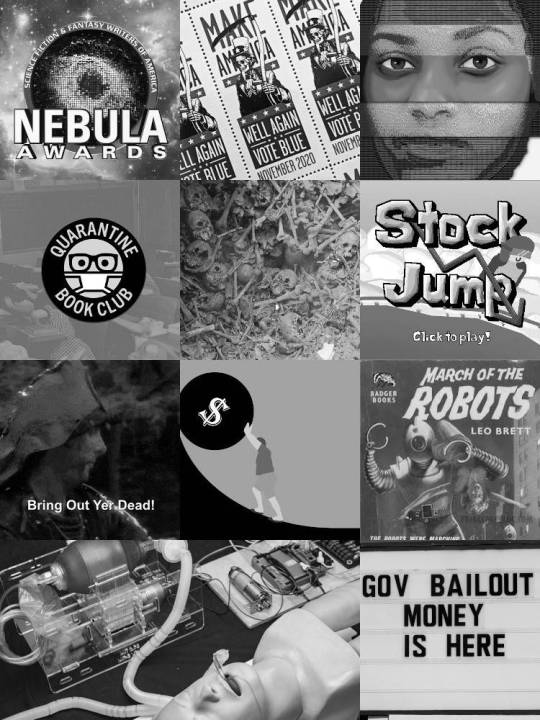
Today's links
This year's Nebula Awards will be held online: It's $150, and raising funds to bail out corona-shattered writers.
Make America Well Again stamps: from the artist who brought you the Trump Zero Cents stamp.
Data is the new toxic waste: It never was the "new oil" (my latest podcast).
Stock Jump: A ski-game that lets you play the stock charts of cratered businesses.
Murdering 20% of elderly Americans is bad strategy for the GOP: Terrified old people are the turkeys who vote for plutes' Christmas every four years.
Join me on the Quarantine Book Club: April 1, 3PM Pacific.
The Party of Death: It's a good time to buy exterminism futures.
Financial stability vs economic stability: Debts that can't be paid, won't be paid.
Quarantine reveals the falsity of the automation crisis: Augmentation isn't replacement.
Bailouts and moral hazard: If we never teach big business, it won't ever learn.
MIT's ingenious manual/automatic open source ventilator: Now in FDA testing.
This day in history: 2005, 2010, 2015, 2019
Colophon: Recent publications, current writing projects, upcoming appearances, current reading
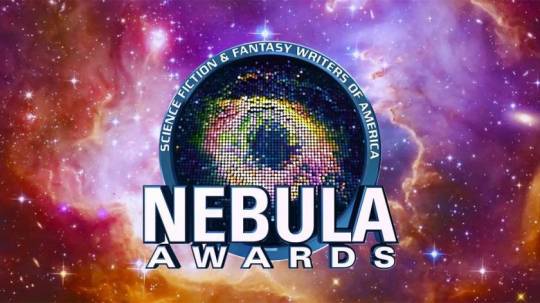
This year's Nebula Awards will be held online (permalink)
This year's Nebula Awards weekend is moving online, thanks to decisive action from SFWA and Mary Robinette Kowal.
https://www.sfwa.org/2020/03/22/announcing-the-transformation-of-the-2020-nebula-conference-and-covid19-relief/
It'll include "panels, solo presentations, conference mentorships, workshops, forums, chats, and virtual room parties (including a dance party hosted by John Scalzi)." Part of the proceeds will go to relief for sf writers who are in covid-related financial distress.
It runs May 29-31, including a livestream of the Nebula Awards banquet. Registration is $150 and comes with a year of access to archived materials and the SFWA Bulletin.

Make America Well Again stamps (permalink)
I bought some of Ben Hannam's Trump No Cents stamps in 2017 and never looked back. I still put 'em on letters.

Now he's got a Make America Well Again stamp, which you can lick (if you dare) and stick for the duration. Remember, USPS is profitable and unsubsidized and Trump's swamp-dwellers want to shut it down and replace it with donors like Fedex and UPS!
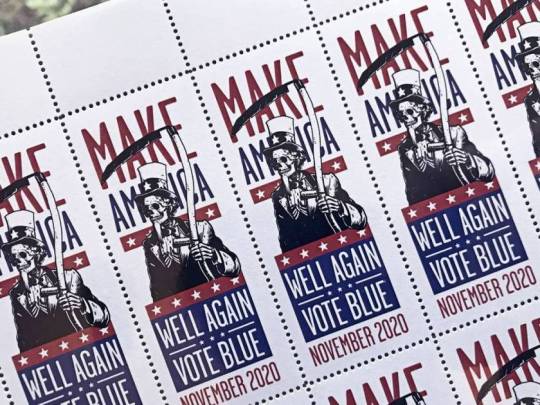

Data is the new toxic waste (permalink)
My latest podcast is a reading of "Data – the new oil, or potential for a toxic oil spill?" — a column arguing that data was never "the new oil" – instead, it was always the new toxic waste: "pluripotent, immortal – and impossible to contain."
https://www.kaspersky.com/blog/secure-futures-magazine/data-new-toxic-waste/34184/
Data breaches are inevitable (any data you collect will probably leak; any data you retain will definitely leak) and cumulative (your company's data breach can be combined with each subsequent attack to revictimize your customers).
Identity thieves benefit enormously from cheap storage, and they collect, store and recombine every scrap of leaked data. Merging multiple data sets allows for reidentification of "anonymized" data, and it's impossible to predict which sets will leak in the future.
These nondeterministic harms have so far protected data-collectors from liability, but that can't last. Toxic waste also has nondeterministic harms (we never know which bit of effluent will kill which person), but we still punish firms that leak it.
Waiting until the laws change to purge your data is a bad bet – by then, it may be too late. All the data your company collects and retains represents an unquantifiable, potentially unlimited source of downstream liability.
What's more, you probably aren't doing anything useful with it. The companies that make the most grandiose claims about data analytics are either selling analytics or data (or both). These claims are sales literature, not peer-reviewed citations to empirical research.
Data is cheap to collect and store – if you don't have to pay for the chaos it sows when it leaks. And some day, we will make data-hoarders pay.
Here's the podcast:
https://craphound.com/podcast/2020/03/23/data-the-new-oil-or-potential-for-a-toxic-oil-spill/
Here's the MP3:
https://ia801406.us.archive.org/9/items/Cory_Doctorow_Podcast_334/Cory_Doctorow_Podcast_334_-Data-_the_new_oil_or_potential_for_a_toxic_oil_spill.mp3
And here's the link to subscribe to the podcast:
http://feeds.feedburner.com/doctorow_podcast
Stock Jump
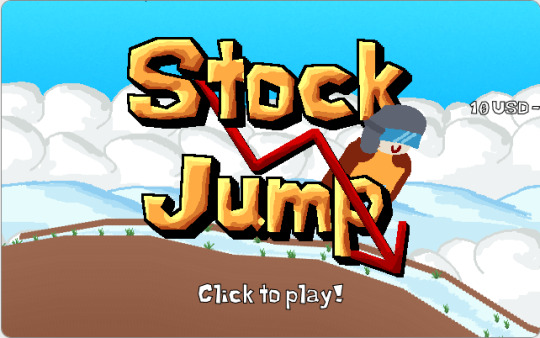
Stock Jump (permalink)
Last week, those of us lucky enough to have retirement savings joined the rest of the world, because our 401(k)s all cratered and all the promising stocks (teleconferencing, guillotines) are all way, way overpriced thanks to panic buying by Republican Senators.
But when life gives you SARS, you make sarsaparilla.
Enter Stock Jump, a ski-jump game whose courses are procedurally generated by the stock charts of shares from around the world.
It's really fun! If you can see through the tears.
http://stockjump.sos.gd/

Murdering 20% of elderly Americans is bad strategy for the GOP (permalink)
A thread by Patrick Nielsen Hayden on Making Light crystallized a thought that literally had me tossing and turning all night, about Trump's decision to risk the lives of ~20% of elderly Americans to goose the stock market.
https://nielsenhayden.com/makinglight/archives/016643.html#4402672
The thing I find baffling is how short-term this thinking is.
Not for Trump, of course, who is legendary for his view of life as a game of running across a river hopping from the back of one alligator to another before he can get his leg bitten off.
But for the right-wing establishment, whose whole schtick is "rationality" and "long-term thinking" and "self-control" (think of the gleeful repetition of the discredited Marshmellow Test and the rhetoric about the "poor life choices" that lead to single parenthood, addiction, and inadequate retirement savings or health insurance).
How is it that these self-congratulatory long-game-players can't see that murdering one in five American seniors is a self-limiting move when frightened old white people are the primary source of turkeys who can be counted upon to vote for Christmas every four years?
The right has an antimajoritarian, elitist agenda. Right-wing thought is essentially the belief that some people are destined to rule, and others are destined to be ruled over by their betters, and the world is best when the right people are atop the pyramid. Splits in the right are about who should rule: Dominionists want Christian men in charge; libertarians want bosses in charge, imperialists want America in charge, racists want white people in charge, etc.
Antimajoritarian projects struggle in democracies, for obvious reasons. When your platform is "only 1% of us should be making decisions" it's hard to win 51% of the vote. That's why the right focuses so hard on gerrymandering and voter suppression, and why the otherwise untenable coalitions — finaciers and young-Earth Creationists, say — persist.
But the biggest source of ballots in support of rule by elites is frightened people, especially frightened bigots who think that the elites will promote their interests ahead of the disfavored minorities (think: Dixiecrats).
So murdering 20% of the most reliable source of votes for elite rule is a farcically shortsighted thing to do.
I am terrified of a Biden candidacy not merely because I think his policies are poor, but because I think he is really bad at being a candidate, and will struggle to win.
But Trump murdering 20% of his base might just be enough to make him lose. It may be that while he could murder someone in the middle of 5th Ave and get away with it, he can't sentence 20% of US pensioners to gruesome deaths and get away with it.
I'm not gleeful at this prospect. I am totally aghast. I barely slept last night, waking up dozens of times with this genocide playing out in my imagination.
But I am incredibly surprised. How does the self-declared Party of the Long View not see that this is going to destroy it?
The stock market is circling the drain and obviously this is very distressing for the donor class, but almost no Americans own any significant stocks, because most Americans have NO savings. The idea that rescuing share prices by killing the elderly will get the turkeys out to vote for Christmas is clearly wrong.
For more on antimajoritarianism and the right, read Corey Robin's outstanding book, "The Reactionary Mind."
https://twitter.com/doctorow/status/1234117673316782082

Join me on the Quarantine Book Club (permalink)
I'm going participate in a session of the Quarantine Book Club on April 1 at 3PM Pacific, where we're discussing my book Radicalized. Tickets here:
https://www.eventbrite.com/e/quarantine-book-club-cory-doctorow-tickets-100931360416
If $5 is a burden for you, you can get in free with the code ALLAREWELCOME.
Hope to see you!
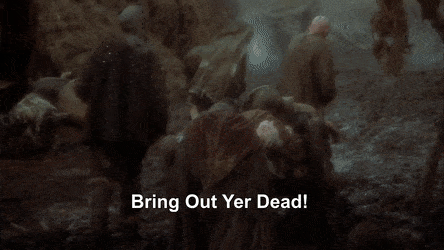
The Party of Death (permalink)
In his 2017 book Four Futures, Peter Frase uses science fiction to sketch out four ways our society could go as capitalism ruptures, from communism to exterminism, this being the expression of bosses' fear and dependence on workers.
https://boingboing.net/2017/01/06/four-futures-using-science-fi.html
Frase posits a possible mass-automation event that makes workers superfluous (I'm skeptical of this: climate change guarantees 2-3 centuries of full employment, e.g., relocating every coastal city).
But in light of the Current Situation, he imagines a different form of exterminism.
https://jacobinmag.com/2020/03/coronavirus-economy-public-health-exterminism/
It's not just the GOP's willingness to murder 20% of seniors in the hopes of rescuing the Dow.
Plutes and their bootlickers have been calling for mass-deaths as a preferable alternative since the crisis first manifested, as when Tea Party founder Rick Santelli suggested "Maybe we'd be just better off if we gave it to everybody."
And of course, there was Boris Johnson and Dominick Cummings' plan to infect all of the UK to create "herd immunity." As Cummings said, "if that means some pensioners die, too bad."
Now Trump wants to potentially murder 20% of American seniors to rescue share prices, and the GOP is going along with him.
https://twitter.com/doctorow/status/1242444277264740353
The Republicans have become the Party of Death, with establishment figures like Thomas Friedman providing ideological cover (""let many of us get the coronavirus, recover and get back to work").
https://www.nytimes.com/2020/03/22/opinion/coronavirus-economy.html
Frase: "The ghoulishness of this strategy will become apparent when it is too late, when the hospitals fill and the health care system and the economy both collapse."
"Those in power will be held blameless, and those with wealth will sadly lament the foolishness of the lesser orders."
"Socialists have always insisted that human needs should take precedence over profit, that the stock market is not the economy, and that we need to utterly transform an economy that is immiserating working people and destroying the planet. That message will only become more urgent as our opponents across different parts of the ruling class come to the conclusion — mournfully for some, gleefully for others — that in the contest between loss of profit and loss of life, they choose death."

Financial stability vs economic stability (permalink)
Michael Hudson is a fascinating thinker, an expert in the history of debt and debt-forgiveness. See, e.g., this:
https://pluralistic.net/2020/03/23/tacocat-vs-dog-prostates/#jubilee
In a new interview, Hudson delves into that history: interest-bearing debt was invented in the third millennium BCE, and quickly kings learned that they had to have periodic debt forgiveness, or compound interest would render all debts unpayable.
https://digitalfinanceanalytics.com/blog/debt-and-power-with-michael-hudson/
Greeks and Romans did away with the practice, and so had to live with six centuries of debt-revolts, as ever-larger fractions of their populace ended up in a form of debt slavery.
Greek Democracy was created to allow commoners to serve in government and so vote to cancel debts. Roman emperors conquered Greece and did away with debt-cancellation, creating an increasingly unstable oligarchy.
That's not far off from where we are today. 90% of debts are held by the richest 10%, and these oligarchs own the political process and refuse to countenance debt-cancellation.
Obama promised to write down mortgages, but instead he bailed out finance, who kicked us all out and bought our houses out from under us, and then rented back to us. Since then, the Fed "has created $4.5 trillion of credit to support prices for real estate."
"The aim has been to make housing more expensive, enabling the banks to collect on their mortgages and not go under. Credit keeps the debt overhead in place, thereby keeping the financial system afloat instead of facing the reality that debt needs to be written down."
Trump's gonna do it again, giving $50b to airlines/Boeing. Since 2008, Boeing has spent $45b on buybacks. Trump's message: "Spend 92-95% of your income to buy your own hares, and the government will print money so you can do it again, because our priority is stock prices."
"Financial stability" is incompatible with "economic stability." Financial stability means never writing down debts so that the bad loans oligarchs made never turn into bad debts. Economic stability requires debt write-downs so that people can be productive.
Obama's bailouts increased big banks' Too Big to Fail status. That's why since 2008, "GDP per 95 percent of the American population is actually shrunk. All the growth in America's GDP has occurred only to the wealthiest 5% of the population."
Today, plutes "hope to use the crisis not to revive the economy, but to just pound it into debt deflation, leaving the debts in place while bailing out the banks and the landlord class."
Here's what "financial stability" looks like: "you have to pay this exponential growth in debt, [and] have less and less to buy goods and services."
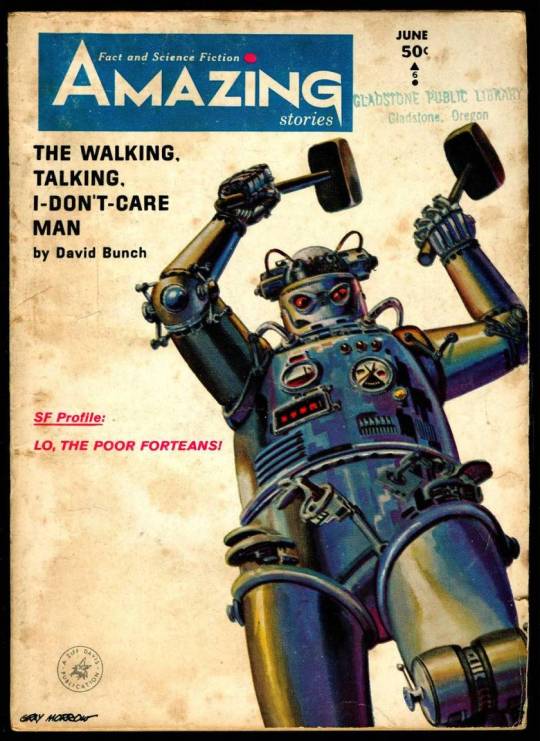
Quarantine reveals the falsity of the automation crisis (permalink)
Automation-based unemployment has always been overhyped. Any work that robots take over merely frees up human workers for the 2-300 year project of climate remediation, including relocating every coastal city in the world.
But automation is also vastly overhyped. Take the oft-repeated claim that "truck driver" is the most common job in America, and first in line to be automated. It's just wrong.
First, because the BLS "truck driver" category includes long-haul truckers, delivery drivers, couriers, and dozens of other subprofessions, most of which are far, far away from being automatable.
https://hbr.org/2019/09/automation-isnt-about-to-make-truckers-obsolete
(More importantly, though: the most automatable category is long-haul driver, and an automated long-haul truck in its own dedicated lane is just a shitty train).
The overhyped nature of technological displacement is on perfect display during the pandemic quarantine. As many "low skilled" (which is to say, "low waged") workers withdraw from the workforce, the economy has ground to a halt.
So much so that the right is now prepared to throw 20+% of seniors into the volcano to appease the market gods.
The category error committed by automation-fretters is to confuse "automating a job" with "augmenting a worker."
"We know that robots are great at repetitive work. they can do that forever. What's not so great is anything with a human-centered context, a cultural context." -Julie Carpenter
https://www.wired.com/story/robot-jobs-coronavirus/

Bailouts and moral hazard (permalink)
It's been barely a decade since the USG bailed out big businesses and the fact that we're here again reveals some of the glaring failures in the last bailout. Any new bailout should correct those errors by putting restrictions on bailed-out companies.
https://pluralistic.net/2020/03/19/gb-whatsapp/#peoples-bailout
There have been some good proposals on these lines, like those from AOC and Stephanie Kelton:
https://pluralistic.net/2020/03/21/most-dangerous-ghost/#peoples-bailout
(whenever I write about this in public, I'm inundated with angry tweets from sociopaths with "investor" in their bios)
We're running out of time to get this right. DC is so filled with money-hungry lobbyists that they can't practice adequate social distancing, and they're collectively seeking trillions in string-free public money for their paymaster.
https://www.ineteconomics.org/perspectives/blog/rule-number-1-for-government-bailouts-of-companies-make-sure-voters-and-taxpayers-share-in-the-upside
At a minimum, any bailouts should come in exchange for convertible corporate bonds that let the USG take an ownership stake in any business that fails to repay its public debts. That's a minimum, as is a ban on stock buybacks for bailed out companies.
We need very strict limits on lobbying by bailed out firms: "If we are not to finance our own bamboozlement, any company receiving bailouts must be required each month to file full reports on political contributions and lobbying expenditures to candidates and parties."
This goes for dark money contributions, including 527 funds, and corporate/exec contributions to trade associations and other lobbying fronts, think-tanks, and other political influence vehicles.
"Unlike last time, when Hank Paulson, Tim Geithner, and Ben Bernanke failed to give the public a serious share of the upside, the bailed out firms should be compelled to issue convertible bonds to the government."
"Those bonds should make the government the senior creditor to the firm for the value of the principal as long as the debt is unpaid…As firms and the economy recover, the shares can be sold on the open market, yielding a handsome return to the Treasury."
The right likes to harp about "moral hazard" as an excuse for cutting aid, to, say, single mothers ("It only encourages them"). But what about businesses that needed trillions in 2008 and now need trillions more? What lesson are we teaching them?
(Image: Alex Proimos, CC BY)

MIT's ingenious manual/automatic open source ventilator (permalink)
At the end of last week, a crowdsourced design for an open-source hardware ventilator entered testing with the Irish regulator, a week after work began on the project.
https://pluralistic.net/2020/03/20/pluralistic-20-mar-2020/#oshw-breathing
Now, hot on its heels, an MIT open source hardware ventilator team has submitted its design to the FDA for testing and approval, under the Emergency Use Authorization (EUA) authority.
https://e-vent.mit.edu/
It eliminates many possible sources of failure by replacing an electric pump with a manual one, which can, in turn, be operated by a separate, very simple, Arduino-controlled system (which can be readily swapped out for a human hand if it fails).
As Hackaday points out, "Almost as interesting as the device itself is the comments people are leaving about the design."
https://hackaday.com/2020/03/23/mit-ventilator-designed-with-common-manual-resuscitator-submitted-for-fda-testing/
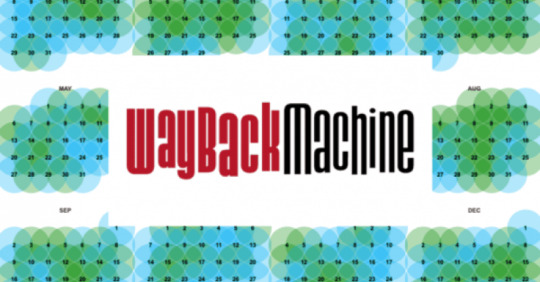
This day in history (permalink)
#15yrsago Record sales up, P2P sales up — RIAA's story doesn't add up https://web.archive.org/web/20050822053404/http://news.com.com/2100-1027_3-5631698.html
#15yrsago Octopuses dressed up as sea coconuts sneaking on two legs https://www.nature.com/news/2005/050321/full/050321-14.html
#10yrsago Pooh vs Alien: Webcomics realize their full potential at last http://godxiliary.com/alienvspooh/
#10yrsago Airport worker caught photographing screen as female worker passed through naked scanner https://www.theguardian.com/uk/2010/mar/24/airport-worker-warned-body-scanner
#10yrsago UK record lobby: democracy is a waste of time https://www.openrightsgroup.org/blog/2010/corporate-lobbyists-no-need-for-democracy
#5yrsago How medical abortion works https://www.ohjoysextoy.com/medical-abortion/
#5yrsago ACLU sues TSA to make it explain junk science "behavioral detection" program https://www.aclu.org/press-releases/nyclu-and-aclu-sue-tsa-records-discredited-behavior-detection-program
#5yrsago Randomized dystopia generator that goes beyond the Bill of Rights https://www.harihareswara.net/dystopia/
#1yrago Man stole $122m from Facebook and Google by sending them random bills, which the companies dutifully paid https://www.bleepingcomputer.com/news/security/lithuanian-pleads-guilty-to-stealing-100-million-from-google-facebook/
#1yrago Chelsea Manning is being held in prolonged solitary confinement, a form of torture https://xychelsea.is/?page_id=28

Colophon (permalink)
Today's top sources: Tor.com (https://tor.com), Naked Capitalism (https://nakedcapitalism.com/), Slashdot (https://slashdot.org/).
Currently writing: I'm getting geared up to start work my next novel, "The Lost Cause," a post-GND novel about truth and reconciliation.
Currently reading: Just started Lauren Beukes's forthcoming Afterland: it's Y the Last Man plus plus, and two chapters in, it's amazeballs. Last month, I finished Andrea Bernstein's "American Oligarchs"; it's a magnificent history of the Kushner and Trump families, showing how they cheated, stole and lied their way into power. I'm getting really into Anna Weiner's memoir about tech, "Uncanny Valley." I just loaded Matt Stoller's "Goliath" onto my underwater MP3 player and I'm listening to it as I swim laps.
Latest podcast: Data – the new oil, or potential for a toxic oil spill? https://craphound.com/podcast/2020/03/23/data-the-new-oil-or-potential-for-a-toxic-oil-spill/
Upcoming appearances:
Quarantine Book Club, April 1, 3PM Pacific https://www.eventbrite.com/e/quarantine-book-club-cory-doctorow-tickets-100931360416
Museums and the Web, April 2, 12PM-3PM Pacific https://mw20.museweb.net/
Upcoming books: "Poesy the Monster Slayer" (Jul 2020), a picture book about monsters, bedtime, gender, and kicking ass. Pre-order here: https://us.macmillan.com/books/9781626723627?utm_source=socialmedia&utm_medium=socialpost&utm_term=na-poesycorypreorder&utm_content=na-preorder-buynow&utm_campaign=9781626723627
(we're having a launch for it in Burbank on July 11 at Dark Delicacies and you can get me AND Poesy to sign it and Dark Del will ship it to the monster kids in your life in time for the release date).
"Attack Surface": The third Little Brother book, Oct 20, 2020. https://us.macmillan.com/books/9781250757531
"Little Brother/Homeland": A reissue omnibus edition with a new introduction by Edward Snowden: https://us.macmillan.com/books/9781250774583
36 notes
·
View notes